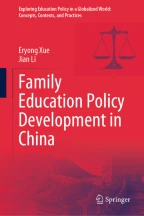The Fairness of Family Education: Challenges and Strategies

This chapter examines the fairness of family education. Family fertility is the combination of reproduction and care, birth is only the first step, education is the most important. At the beginning of the reform and opening up, education competition did not form because most families had similar economic conditions and regional education levels do not vary much. Education is mainly achieved through public education investment, and the family education burden is small. With the improvement of the level of economic development and the promotion of education urbanization, education competition is becoming increasingly fierce, and schools are no longer the sole undertaker of education subjects, and families and the market have become the key complementary forces of education competition. Family education has different connotations in different historical backgrounds, mainly embodied in the equal distribution of educational resources, equal access to educational opportunities, the fairness of educational achievements, and the influence of policies and social culture. The historical experience of family education equity in China is mainly divided into several stages: the early exploration of educational reform, the exploration of educational equity after the founding of New China, the development of educational equity since the reform and opening up, and the characteristics of family education equity in the new era. Face different challenges of family education, we should set up a problem awareness, explore the new era of China’s family education equity path.
This is a preview of subscription content, log in via an institution to check access.
Access this chapter
Subscribe and save
Springer+ Basic
€32.70 /Month
- Get 10 units per month
- Download Article/Chapter or eBook
- 1 Unit = 1 Article or 1 Chapter
- Cancel anytime
Buy Now
Price includes VAT (France)
eBook EUR 111.27 Price includes VAT (France)
Hardcover Book EUR 137.14 Price includes VAT (France)
Tax calculation will be finalised at checkout
Purchases are for personal use only
References
- Hong, M. (2012). Perspective on the focus and difficulties of family education in China—Based on analysis of 600 family education consultation cases. The China Youth Research, 20(11), 55 + 59. Google Scholar
- Li, J. (2022a). Exploring the new educational policies of foreign exchange and cooperation in the epidemic era: A policy mapping perspective. Beijing International Review of Education,4(2022), 759–765. Google Scholar
- Li, J. (2022b). Financial policy for promoting equality education in rural areas: Two key policy implementation in China. Beijing International Review of Education,4(2022), 505–511. ArticleGoogle Scholar
- Li, J., & Li, K. (2022). Multiple perspectives on the educational policies on studying in China during the epidemic era. Beijing International Review of Education,4(2022), 750–758. Google Scholar
- Li, J., & Xue, E. (2022). Examining the internationalization policy of higher education in China: Historical stages, challenges, and strategies. Beijing International Review of Education,4(2022), 673–686. Google Scholar
- Li, J., Xue, E., & Li, K. (2023). Exploring the challenges and strategies of female teacher sustainable development in China’s world-class universities: Stakeholders’ perspectives. Sustainability,15(4), 3488. https://doi.org/10.3390/su15043488ArticleGoogle Scholar
- She, S. (2001). An analysis on fine traditions and methods of ancient family education in China—A look at the traditions and methods of ancient family education in China from family training. Journal of Wuhan University (Social Science Edition),20(01), 116–122. Google Scholar
- Song, W. (2008). Problems and countermeasures in the combination of family education and school education. Education and Occupation,20(32), 191–192. Google Scholar
- Sun, Y., & Qu, J. (2019). Evolution, characteristics, and prospects of family Education policy in China. Science of Education,36(03), 91–96. Google Scholar
- Teng, Y. (2022). Discussion on the cooperation boundary between family education and school education. Contemporary Educational Science,20(02), 17–24. Google Scholar
- Wang, J. (2001). On the thought of family education in ancient China. Journal of South China Normal University (Social Science Edition), 20(02), 99–106+123. Google Scholar
- Wei, Y., & Li, J. (2022). Analyzing the new educational policies on studying abroad in the epidemic era: Insight from China. Beijing International Review of Education,4(2022), 741–749. Google Scholar
- Wen, J. (2003). A brief discussion on the status and function of family education. Modern Educational Science,20(06), 45–46. Google Scholar
- Xue, E., Li, I., & Zhang, J. (2023). China’s new idea of socialist core value education: President Xi’s philosophical discourse on the education of socialist core values. Beijing International Review of Education,5(2023), 97–111. ArticleGoogle Scholar
- Xue, E., & Li, J. (2022a). The weak school reform in China’s rural areas: A policy mapping perspective. Beijing International Review of Education,4(2022), 491–497. ArticleGoogle Scholar
- Xue, E., & Li, J. (2022b). Examining the internationalization policy of higher education in China: Historical stages, challenges, and strategies. Beijing International Review of Education,4(2022), 766–772. Google Scholar
- Yang, X. (2007). Challenges, problems, and countermeasures of family education in China at present. Exploration and Controversy,20(02), 68–71. Google Scholar
- Yao, J. (2018). From children to families: A review of family education legislation. China Education Journal, 20(09), 34–38+80. Google Scholar
- Zhang, D., & Gao, S. (2020). Function evolution and value enhancement of modern family education—On the modernization of family education. Chinese Journal of Education,20(01), 66–71. Google Scholar
- Zhang, L. (2006). Tradition, reality and countermeasures of family education in China. China Education Journal,20(06), 36–39. Google Scholar
Author information
Authors and Affiliations
- China Institute of Education Policy, Faculty of Education, Beijing Normal University, Beijing, China Eryong Xue
- Institute of International and Comparative Education, Beijing Normal University, Beijing, China Jian Li
- Eryong Xue

